Digitizing History: Palestine Broadcasting Service, 1936-1948
Crawford B. McNair
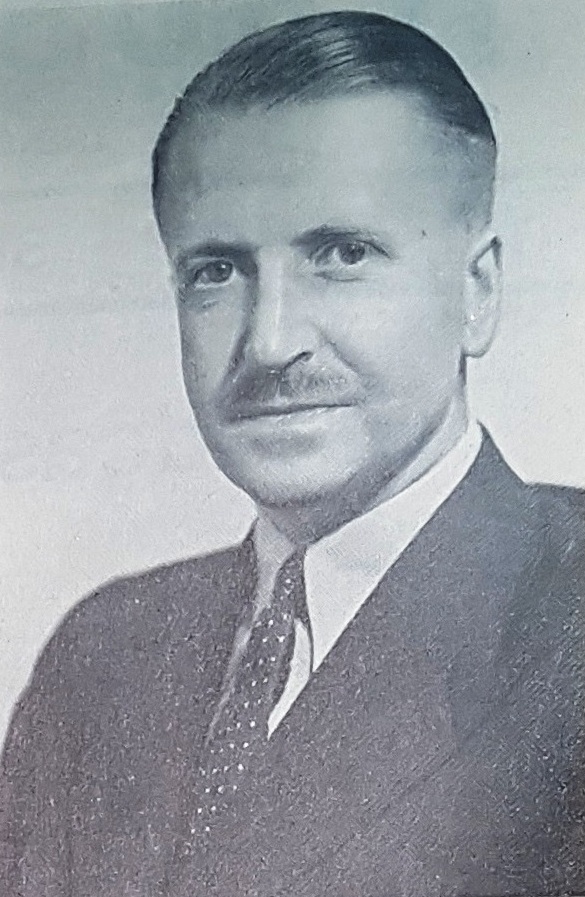
Photo from Library of Congress.
One of the early directors of PBS was Crawford B. McNair, not only was he seconded from the BBC, he was also a professional conductor of the BBC Northern Region Orchestra.
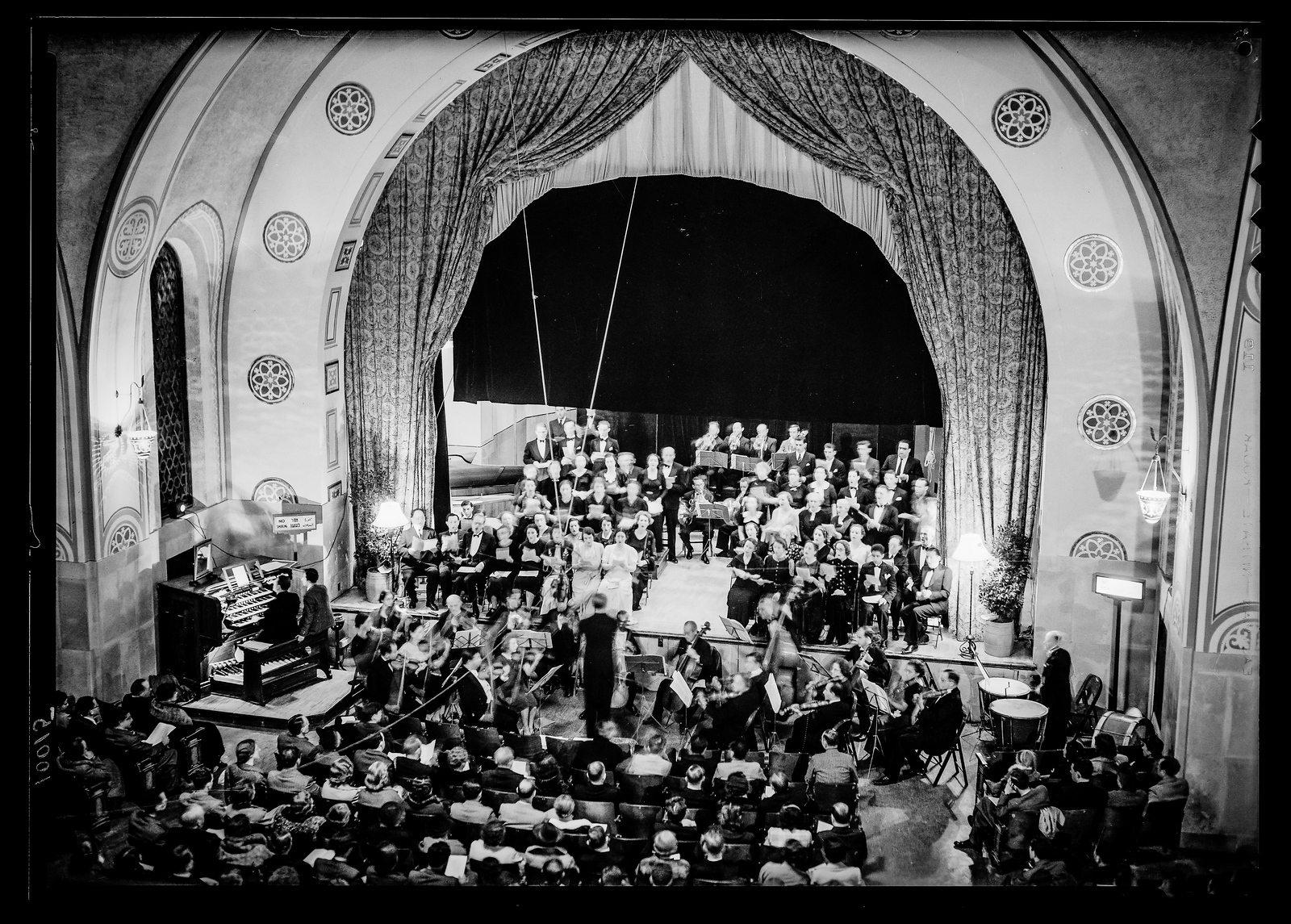
Crawford McNair, Director of Programmes of the Palestine Broadcasting Service (PBS), conducting the PBS Choral Society and the PBS Orchestra, at the inaugural concert of the Choral Society, at the YMCA, Jerusalem, 1938.
"Although Crawford McNair, Director of Programmes of the PBS, appears in this picture as the conductor of the newly-formed PBS Choral Society, he is equally at home in pantomime and variety productions and in dramatic shows. He received his early training in radio in London and is the composer of the music for Geoffrey Bridson's 'Dove Days' which was given a repeat performance on the National Programme in London a short time ago."
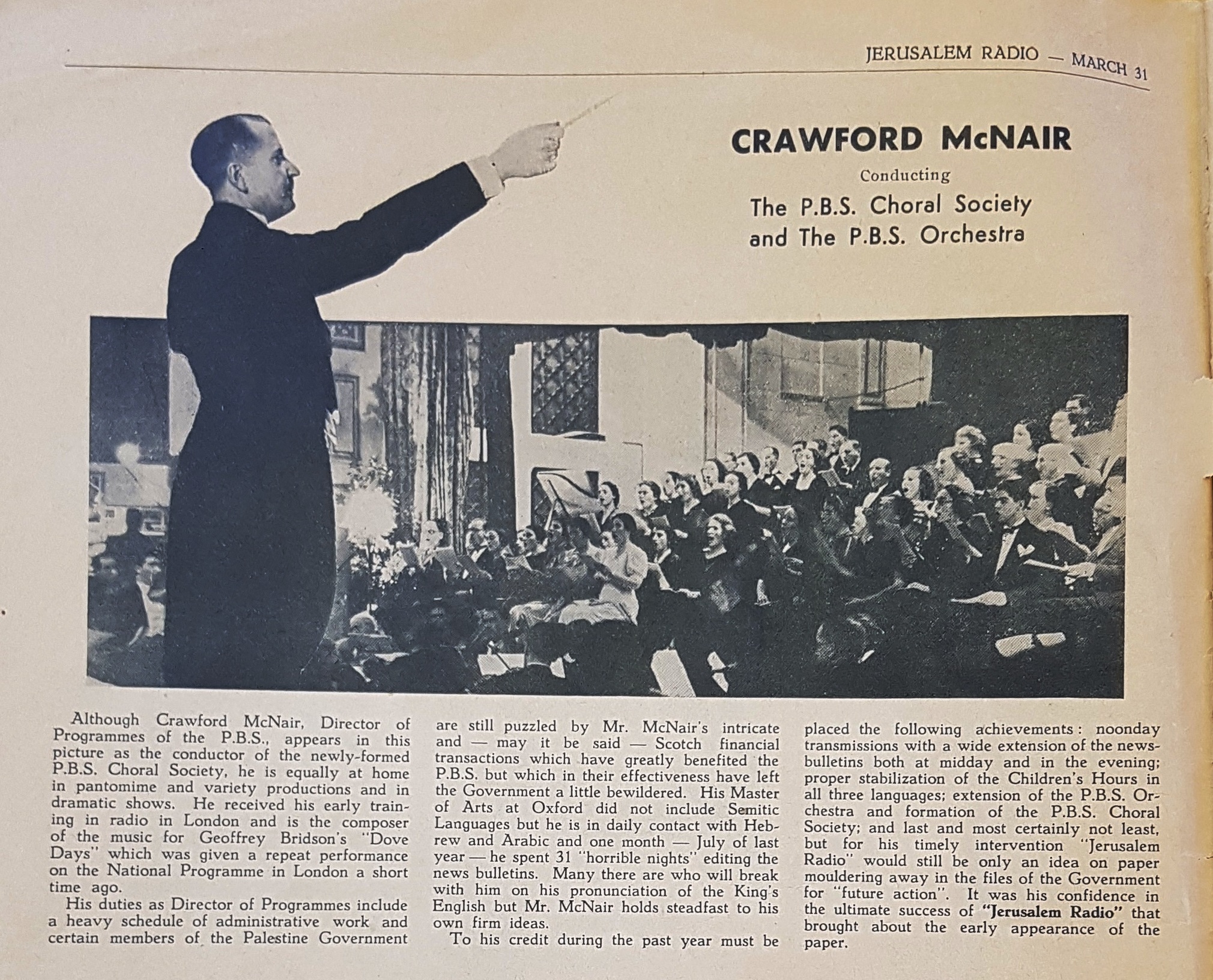
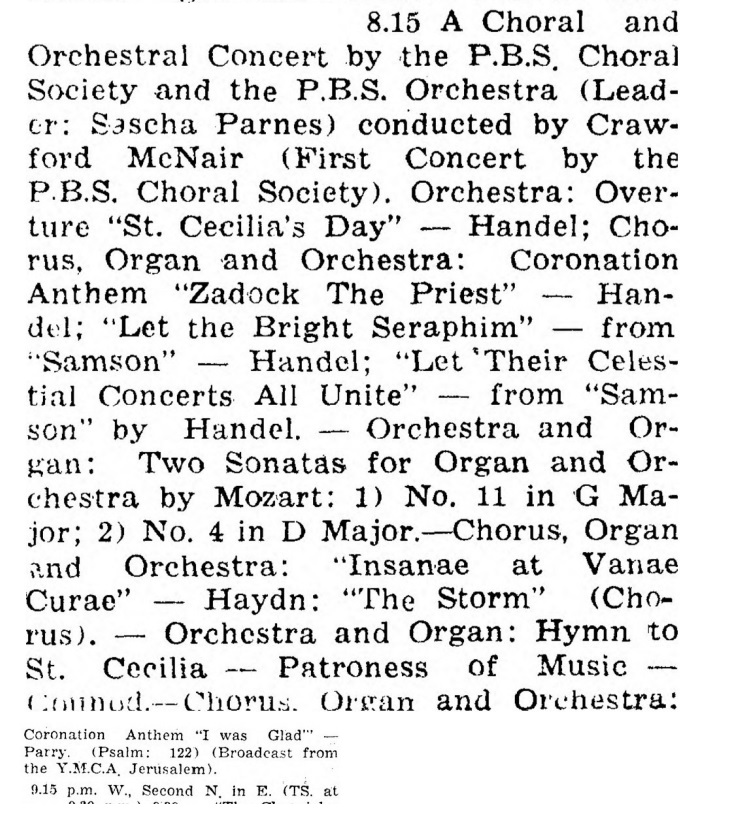
Crawford McNair conducting the inaugural concert of the PBS Choral Society and the PBS Orchestra, YMCA, November 22, 1938. Broadcast live on radio.
"His duties as Director of programmes include a heavy schedule of administrative work and certain members of the Palestine Government are still puzzled by McNair's intricate and - may it be said - Scotch financial transactions which have greatly benefited the PBS, but which in their effectiveness have tleft the government a little bewildered. His Master of Arts at Oxford did not include Semitic Languages but he is in daily contact with Hebrew and Arabic and one month - July of last year [1938] - he spent 31 "horrible nights" editing the news bulletins. Many there are who will break with him on his pronunciation of the King's English but Mr. McNair holds steadfast to his own firm ideas."
"To his credit during the past year must be placed the following achievement: noonday transmissions with a wide extension of the news bulletins both at midday and in the evening; proper stabilization of the Children's Hours in all three languages; extension of the PBS Orchestra and the formation of the of the PBS Choral Society; and last and most certainly not least, but for his timely intervention "Jerusalem Radio" would still be only an idea on paper mouldering away in the files of Government for "future action". It was his confidence in the the ultimate success of "Jerusalem Radio" that brought about the early appearance of the paper."
One of the most prominent guests he hosted in Palestine was the conductor, Sir Malcolm Sargent, then just Dr. Malcolm Sargent. He traveled to Palestine three years in a row 1937-1939, while it was still possible to travel there safely by air, before the war (this period is now known as the Arab Riots, 1936-1939). In May 9, 1937, Dr. Malcolm Sargent gave a 15 minute PBS radio broadcast talk on Elgar. A year later, Friday, May 13, 1938 , he gave a 10 minute radio broadcast talk on his trip to Palestine. In the days before radio, for example, giving a talk or lecture from a stage, was straight forward. There was a direct connection between the guest speaker and his/her audience. But not so radio. Radio was a new technology that had to be learned from scratch. The broadcaster or guest had no idea if anyone was listening to them at all. The message could fall on deaf ears. They had to find out who was listening to them and what the thoughts on the programs were. They developed many creative ways to reach the audience. There were many routes to reaching a wide an audience as possible. The PBS set up programs that targeted schools, the home, and youth, among others.
|
JERUSALEM RADIO - JANUARY 20, 1939
Crawford McNair Director of Programmes, P.B.S. Mr. McNair, who has served as Acting Director of the P.B.S. since the departure of Stephen Fry in July, 1938, has had a long and fruitful association with radio, and he joined the P.B.S. staff as Deputy Director of Programmes in March 1937. Prior to that he was Deputy Conductor of the B.B.C. Northern Orchestra and for three years was Assistant Music Director to the Northern Region. Prior to his B.B.C. staff appointment, Mr. NcNair was connected with the B.B.C. as an "outside artist" in London for over one year. Mr. McNair has also been the conductor of the Oxford Symphony Orchestra and has appeared as a conductor both in London and the provinces and has held musical appointments abroad.On taking over the acting directorship of the Jerusalem station, Mr. McNair immediately plunged Into ,the work of consolidating and amplifying the scope of the P.B.S. During his period of service he has brought about a new timing schedule more suited to the needs of the public and more adaptable to the limited budget at his disposal. He has also introduced the midday programmes which he hopes to extend in the near future, so as to give continuous listening time from 1:30 to 10 p.m. Among his major achievements may be counted the formation and development of the P.B.S. Orchestra to a first class musical ensemble and the creation of the P.B.S. Choral Society, a completely new organization which in its first concerts has won a considerable following. It is the more remarkable that in the creation of the choral society, Mr. McNair has been successful in bringing together members of each of the three communities in Palestine, for joint performance under his baton. Essentially a man of music (Malcolm Sargent once called him "my most brilliant pupil"), the new Director of Programmes has not advanced the musical side of the programmes at the expense of talks and dramatic productions; the scope of these has also been and is being extended. Developments in each of the Children's Hours are also on foot, and a good deal of time and trouble is being taken to make these "corners" suitable to the demands, needs and tastes of the children. During his tenure, also, Jerusalem Radio saw the light of day, and no small part in the launching of this journalistic enterprise was taken by the new Director of Programmes. We wish him the best of luck in his position.
|
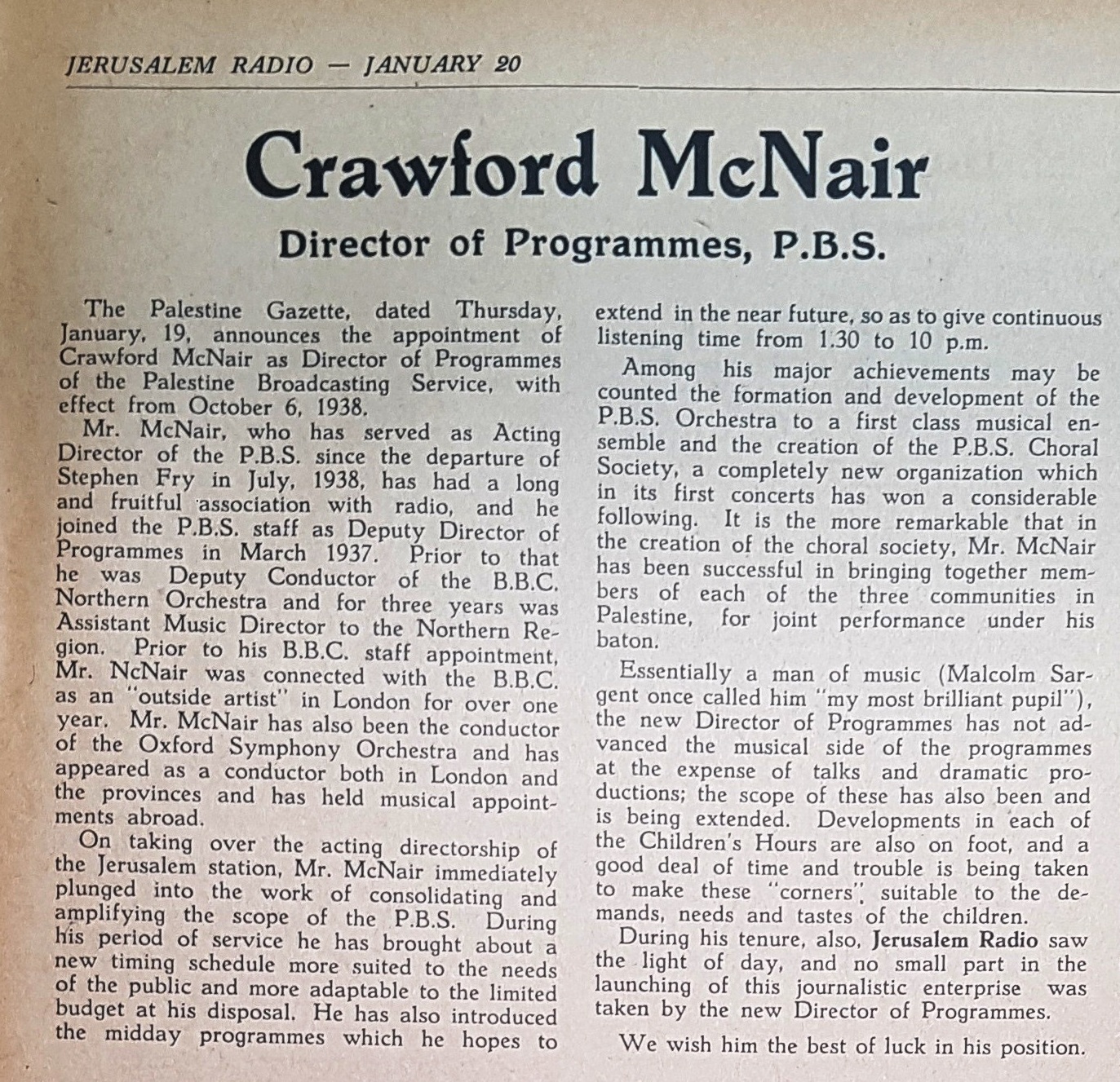
|
|
PBS Orchestra, Tuesday November 8, 1938 at 8:15 PM |
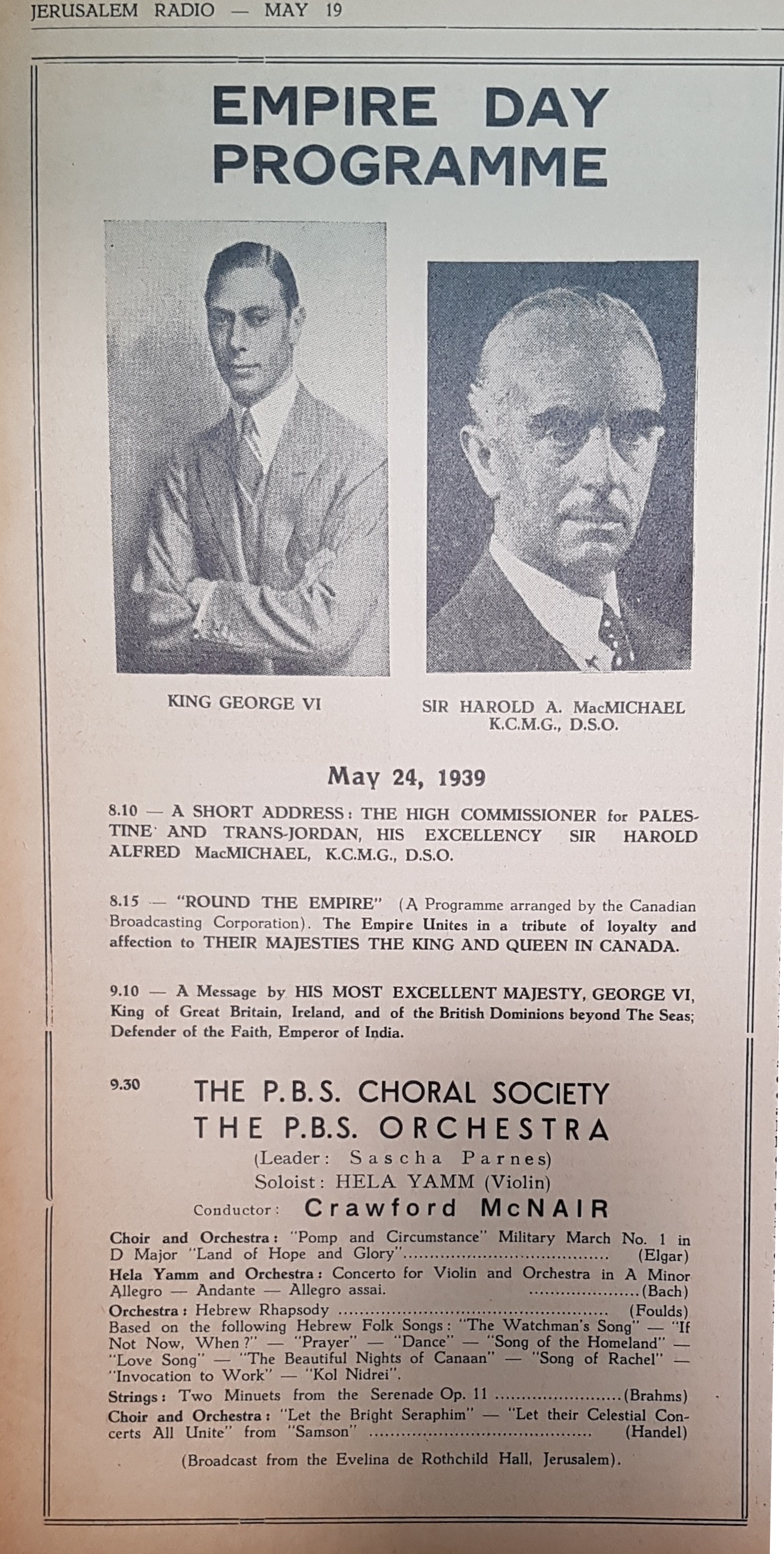
|
|
Crawford McNair Opens Palestine Orchestra's Season
The Palestine Orchestra will inaugurate its third season on October 26. The many music lovers who have enjoyed their previous concerts will very much appreciate the Orchestra's successful efforts to carry on in spite of the troubled times. The Palestine public can do its share in assisting In this difficult task not only by visiting the single concerts but also by taking advantage of the full-season subscription offers. Radio listeners in particular will be interested to learn that the opening series in the three towns is to be conducted by Crawford McNair, the Director o[ Programmes of the P.B.S. Palestinians have had many opportunities of gauging his musical calibre when listening to the performances of the P.B.S. Orchestra and the P.B.S. Choral Society under his baton and will now have the opportunity of seeing him and hearing him - as it were - in the flesh. His programme is a carfully chosen one combining both well known and rarely heard masterpieces and rightly designed to appeal to a wide audience. Beethoven's "Egmont" Overture; Vaughan Williams' "Fantasia on an English Folk-Song", and Rachmaninoff's glowing 2nd Pianoforte Concerto (Soloist : lgnaz Tigerman, the head of the Cairo Coservatoire) comprise Part I of the concert. Part II brings us the beautiful, seldom played "Tragic" Symphony of Schubert and the brilliantly orchestrated Symphonic Poem "Les Preludes" by Liszt. "Les Preludes" were composed in January 1854. They were inspired by Lamartine's "Meditations Poetiques" and arE based on the one beginning "What is our Life but a series of preludes to that unknown song, the first solemn note of which is sounded by Death ?" The work is divided into 4 parts - The first descriptive of Spring and Love: the second depicts the tempestuous aspect of Life : the third describes the Consolations of Nature: the Fourth paints in glowing martial colours the Stuggle of mankind and its final Victory. 'The second series of concerts will be conducted by Issay Dobrowen who is expected to arrive in Palestine shortly. He is to include the Third Symphony by Brahms in his first programme. Among the great symphonic works to be played in the first part of the subscription series is Brahms' Fourth and Tchaikowsky's Fifth Symphonies as well as Debussy's Symphonic Poem "La Mer". We wish the Palestine Orchestra all success for the new season.
|
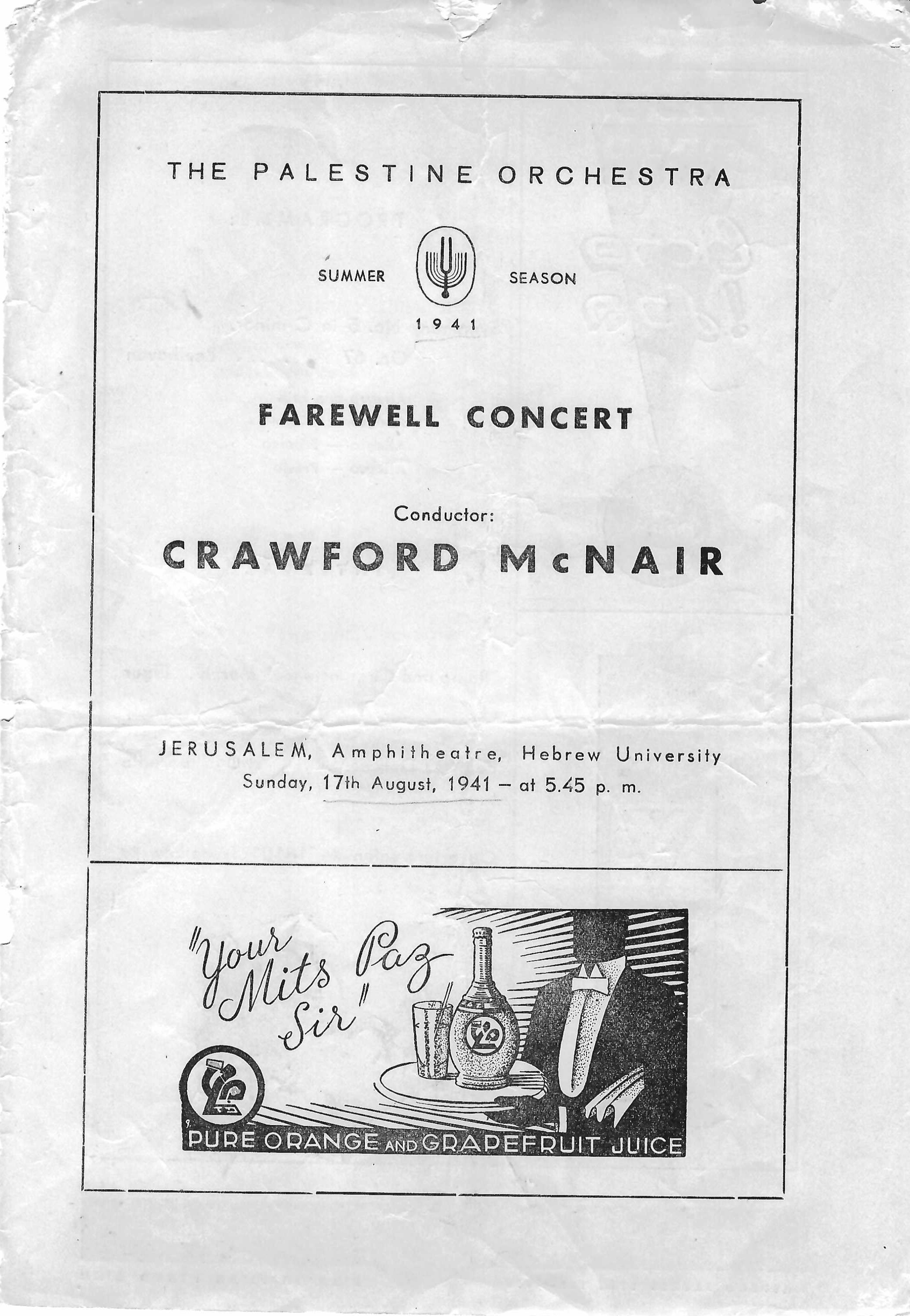
Palestine Orchestra: Summer Season, 1941 Farewell Concert, Conductor, Crawford McNair, Jerusalem Amphitheatre, Hebrew University, Sunday 17th August, 1941- at 5:45 PM |
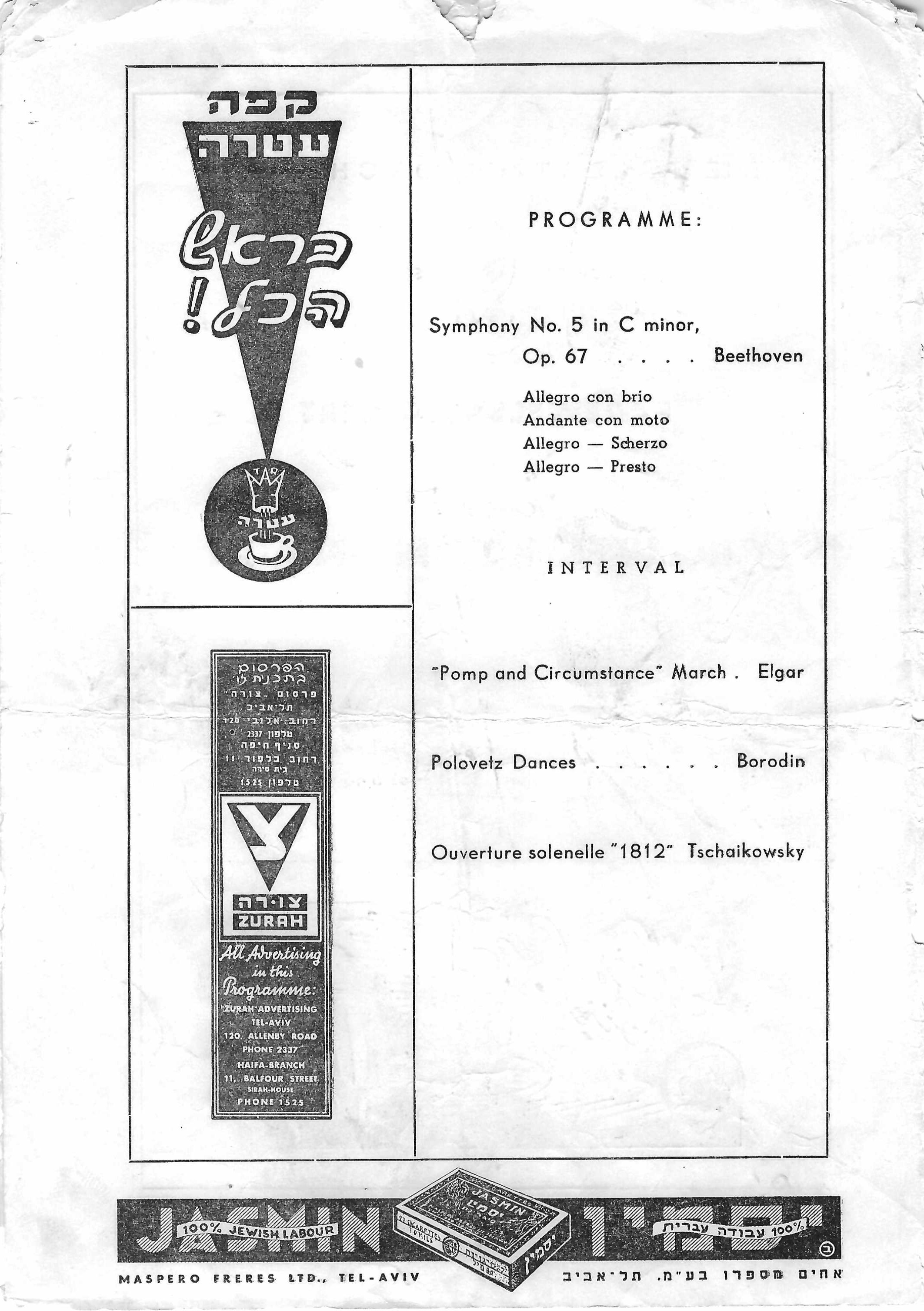 PROGRAMME:
PROGRAMME:
Beethoven Symphony No. 5 in C minor, Op 67
Interval "Pomp and Circumstance March" - Elgar Polovetz Dances - Borodin Overture solenelle "1812" - Tschiakovsky |